Interview: Writer/Actor Nick Gillie on THE DARKNESS: GODDESS REVEALED at The Actors' Gang
May 26 to June 17
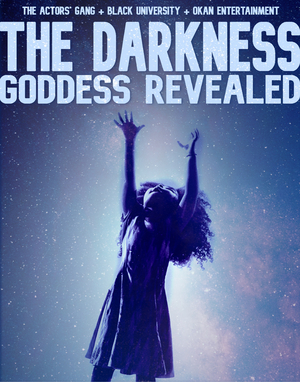
The next production to take The Actors' Gang stage is The Darkness: Goddess Revealed, written and performed by Nick Gillie and directed by Dwain Perry. Presented as a special co-production in partnership with Black University and Okan Entertainment, the story is told through the perspective of three vastly different characters (played by Gillie) who enter the afterlife and meet sacred female beings called The We. But have they gathered to hear the new arrivals’ life stories or have a more spiritual lesson in mind?
I was curious to hear about the genesis of the play, more about the characters, the purpose of The We in the storyline, and Nick Gille’s personal involvement with Black University.
Hi Nick. Thanks for speaking with me today. Let’s talk about your play Goddess Black that premiered at the Hudson Theatre in 2019. What was your inspiration for writing it?
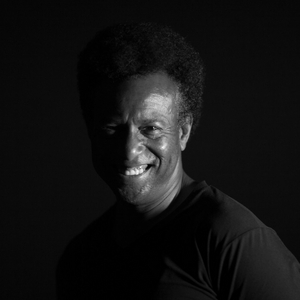
Writer/Actor Nick Gillie
The 2019 Goddess Black was the result of almost 40 years of searching and researching into the drives that lie underneath what we call racism and oppression. In my observation, the issue of so-called racism, at least in terms of Black people and so-called White people, cannot be ended by law or policy resolutions like the Civil Rights Act or external symbolism like an African American president. This was apparent in 1983 during Chicago Mayor Harold Washington’s primary campaign - the intractability of the skin color issue.
Over the decades, increasingly, I became convinced there was an underlying unconscious story at work beneath the Black and White American skin color issues, convinced that under the lethal skin color antipathy lurked an ancient story of power and hierarchy. So, I began to uncover the symbology and mythology of this ancient story, thousands of years in the making and sometimes called the empire mind which concretizes in a culture of faith in material power. The totality of this empire mythology, and the ease with which new cultures are infected by it as well as the ease with which its core hierarchy is projected onto dark vs. light skin color, made for very compelling storytelling for me.
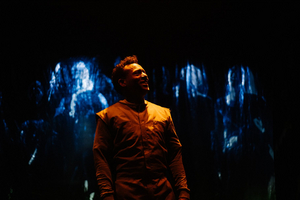
Nick Gillie portrays three very different characters is his play The Darkness: Goddess Revealed.
Photo credit: Rio Phoenix
However, there was a critical hindrance that cornered me into doing this as a solo show. Initially I wanted to create a TV show and pitched it to a few high-up places. However, the concepts underneath of Goddess Black were not attractive to L.A. studios and agents then; which was prior to George Floyd being strangled to death on camera for nine minutes in broad daylight, and the ensuing 2020 uprisings.
But in 2018 after trying for 8 years, I was able to pitch these storytelling concepts around with the help of some friends with access. I got frustrated, and then was encouraged by director Dwain Perry to write a solo show and thereby get to say some of the concepts at least once. So, I did that. Some people responded positively to the piece, including Joaquin Phoenix, whose direct and honest words with friends and himself, an invaluable and courageous quality that particularly moved me. So, I was knocked further into action by his and other comments. And Dwain was brought on to direct the play for the last few years.
Is The Darkness: Goddess Revealed a re-write of that original play?
Yes. But also no. Some stuff remains the same, but I have added to and reshaped the three eternal beings, who are the most important part of the story. And since the original story suffered from the limitation of one male actor – me – who I knew I could work to death for free, I was not confident of being able to do that to anyone else. Happily, now, I have three female actors willing to work wonderfully hard, and thanks to the Actors’ Gang, some wages to offer as well.
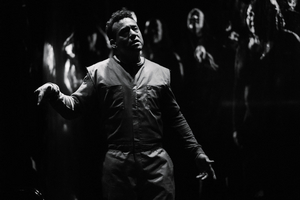
Nick Gillie's characters interact with The We.
What inspired you to re-write it?
There was feedback from the audiences after the first shows asking, “where are the Goddesses?” since there was just one male on stage and no females. On its face this feedback amused me because it is an example of what the play warns against; the idea that the body-type, male-female-light-dark, represents the soul quality, which I examine through the play’s mythology.
But at the same time, the pandemic gave me time to dream more on everything. I had been studying Creative Dreamwork (Kim Gillingham) and Embodied Imagination (Robbie Bosnak) for quite a while and redoubled that work during the pandemic. At the same time, I also drove the American south for six months from Louisiana to the Gullah/Geeche Islands of South Carolina where I talked to older Black people about the issues of the play. From these conversations, and from working with Robbie and Kim, something happened which I wanted to express through the characters of the three eternal beings who are sisters. Those characters then became more specific in The Darkness: Goddess Revealed.
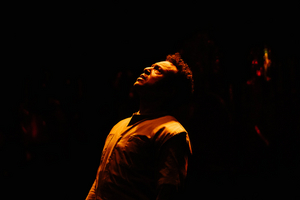
Nick Gillie portrays three very different characters is his play The Darkness: Goddess Revealed
Photo credit: Rio Phoenix
What led to opening the play at The Actors’ Gang?
Longtime friends D.V. DeVincintas and Adele Robbins attended a December ‘22 version of the show at The Hudson. They both, independently, spoke to Tim Robbins about the play and sent him a taped copy of a 2019 version directed by our mutual friend Steve Pink. Tim emailed me an invitation to produce it at the Actors’ Gang; an email I was excited to receive because I’ve followed and appreciated many things Tim has done as a producer and performer to serve the collective spirit. Also, over the past 3 decades, I have observed Tim’s actions which provided me with so much trust in him.
How would you summarize the theme of the play?
The theme of the play is that individualism is an illusion that easily turns into a prison. That the Black Slaves were the spiritual masters of the modern age, and that light exists only in the material world along with rational thought and ego. But Spirit lives in The Darkness, which begins at zero-wavelength of light.
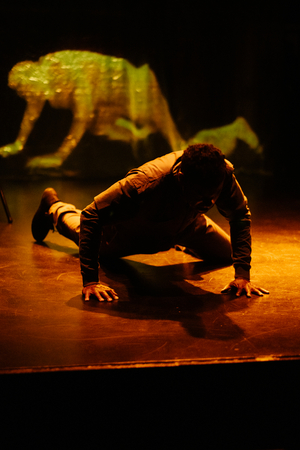 What was the inspiration for the three characters who travel to the afterlife?
What was the inspiration for the three characters who travel to the afterlife?
The characters are all archetypes. In that way they are combinations of people I’ve known or researched, or have archetypal qualities I’ve observed in culture over the years. One name, Patrick Bartholomey, the play’s outlaw, is the real name of a very loved Chicago friend of mine. The character is not based on him, but I always admired his joyfully explosive nature and wanted to think of it while playing the character.
Darrick Taylor, the Black Slave, is an archetype I’ve tried to research in detail. The Library of Congress has recordings and interviews of former Black Slaves, and I’ve listened to and read all of them several times over. I read many other books and traveled the rural south for months, speaking with older Black people about their ancestors. I have great reverence and admiration for the Black Slaves for what they accomplished. They were the spiritual masters of the United States.
Attorney Glory Banks is an archetypal example of what happens when a colonized people begin to emulate the colonizer king.
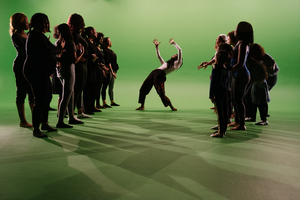
Tell me about the characters called The We, played by Liza Cruzat, Raquel Rosser, and Erin Washington.
The character names are Kamira, Leatril and Sosa. There are some belief systems which hold that the imaginal realm of dreams, spirits, and gods is a real realm and the beings there are also real. To me, Kamira, Leatril and Sosa are as real as I am, but communicating with them is complex for me with my western English educated mind.
How did you go about creating them?
At the very beginning four years ago, I asked Kamira what she wanted, and she said she wanted a picture of herself. So, I looked at pictures on the internet until she insisted that she was a woman and had breasts! I started looking at pictures of older people until I found one Kamira liked. And that visual representation was the beginning of writing Kamira.
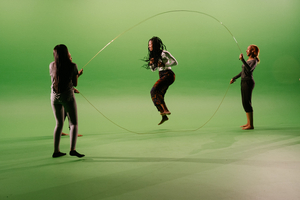
Kamira, Leatril and Sosa are sisters, or what we understand as sisters. But a long time ago, they were one soul. During that time human nature changed, as the Sahara Desert turned from wetland to dry sand, and that one soul split apart. And now in The Darkness play, The We are trying to evolve forward into the next human nature change that will allow Kamira, Leatril and Sosa to reunite as one soul.
Finally, regarding the actors Liza, Raquel, and Erin, I am particularly happy working with them. They are each different yet fit so well together. They trusted us and took on some unusual material while remaining committed to their integrity and our mutual creativity. I’m excited to do this piece with them, hopeful about developing other things for them, and feel lucky to have their faith, or at least their patience.
Are children part of The We?
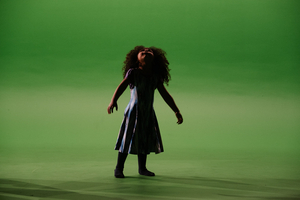
The young girl in the photo is my good friend Ife, who likes the color pink and unicorns. Yes, there are children beings in The We. The audience may not see them on stage, although people like Kim and Robbie and Joaquin probably will. The only common theme to The We is that every one of them was once the soul of a Black Slave. And only former souls of the Black Slaves are among The We.
Why did you decide to call these beings The We?
I first called the spirit beings “The We” and frankly, I thought it was corny - but director Dwain Perry encouraged me to call them that. Then four years later in March ’22, I drove through the Geeche/Gullah islands of South Carolina and talked to Geeche people who call themselves the We people. Thus, the process of creation occurs on a moment-to-moment basis.
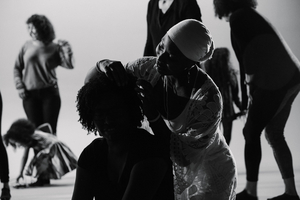
How do The We communicate?
The We communicate with each other as a collective beingness more than they do as individual beings. And so, like the fingers and toes, arms and legs communicate to jog together, so do The We communicate to create.
Is there an important lesson learned by the visitors from The We?
The characters of Glory, Patrick, and Darrick – The visitors – are shedding the remaining light or residue of the material world by telling their story. Two of the characters begin from the point of view that they achieved their life goal. That changes for them as the story goes on, very slowly at first and then all at once. The final character, Darrick, is the only one who knows immediately that he is in the afterlife, and who The We are. So, he begins where the others end, with regret for his mistaken point of view in the light, and arrives at a very, different discovery than the others had about The Darkness.
What do you hope audiences walk away talking about?
A mentor of mine once said that if anything we do has any value to others, it will probably be a total accident on our part. So don’t get too clever and cocky. I just see my job as trying to bring spirit alive in the play space, the spirit to feel. And if by some miracle I manage to do that even just a tiny bit, then the results are up to however spirit functions through others. The rest is complex beyond my understanding right now. And I pray I will always think it so.
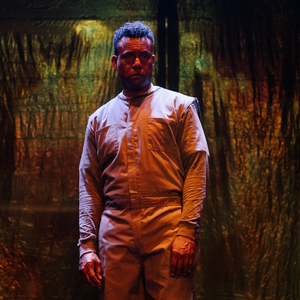
Tell me about your involvement with Black University and the group’s purpose, reflected in your play.
I’m co-founder of Black University with Dwain Perry. Its mission is to remake usage of the words Black and Darkness in the English language and Western Culture. The play is an effort to do that mission.
How did Okan Entertainment decide to co-produce this production?
I am honored to be supported by Okan Entertainment co-founders Hashim Williams and Trifari Williams, both friends and teachers of mine. They attended an early version of the play and indicated they wanted to support the work. I had been a new participant in their Ifa Ille, initiated in Nigeria, and continued to go for a few years. I had never been so affected in a church type place before. It is a very uniquely true place.
So, I was honored when they saw value in my work. Hashim has become a pivotal relationship in my life; someone I’ve been dragging with me for the past three years from project to project. As for Trifari, she has a something-power, and is totally committed to be in service to uplift the power of people struggling toward good character. I am grateful to be associated with them.
Is there anything else you would like to share about your play?
So many people have been on the team of this play over the years. There are so many beautiful artists and performers in Los Angeles, and I sure do wish they got paid better and could do more of their own art. It’s too bad the U.S. doesn’t pay creators enough to live comfortably, like I’ve heard England and Sweden do. All the U.S. creatives that I know simply want to serve and uplift community. Just as I do with my play.
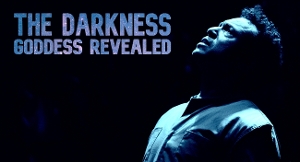
The Actors’ Gang, in partnership with Black University and Okan Entertainment, presents The Darkness: Goddess Revealed, written and acted by Nick Gillie, a bold piece of intimate theater about the mysterious spirituality that unites all people, directed by Dwain Perry. There are nine performances May 26 to June 17 on Fri/Sat 8pm, with one Sunday matinee on May 28 at 2pm, at the home of the Actors’ Gang, the Ivy Substation, 9070 Venice Blvd., Culver City, CA 90232. Tickets are $35, available at www.TheActorsGang.com, by calling 310-838-4264, or via email to boxoffice@theactorsgang.com.
Comments

Videos
